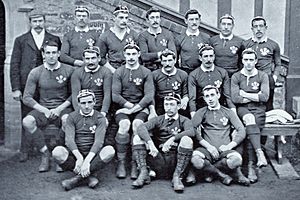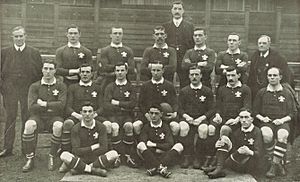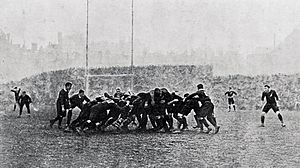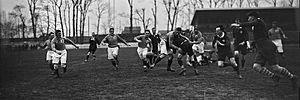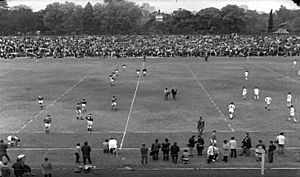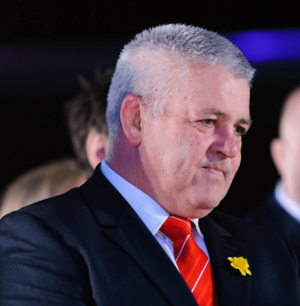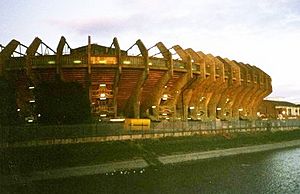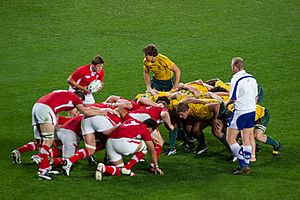Wales national rugby union team facts for kids
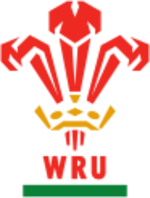 |
|||
| Emblem | Three feathers | ||
|---|---|---|---|
| Union | Welsh Rugby Union | ||
| Head coach | Steve Tandy | ||
| Captain | Jac Morgan | ||
| Most caps | Alun Wyn Jones (158) | ||
| Top scorer | Neil Jenkins (1,049) | ||
| Top try scorer | Shane Williams (58) | ||
| Home stadium | Millennium Stadium | ||
|
|||
| World Rugby ranking | |||
| Current | 12 (as of 14 July 2025) | ||
| Highest | 1 (2019) | ||
| Lowest | 14 (2025) | ||
| First international | |||
(Blackheath, England; 19 February 1881) |
|||
| Biggest win | |||
(Cardiff, Wales; 26 November 2004) |
|||
| Biggest defeat | |||
(Pretoria, South Africa; 27 June 1998) |
|||
| World Cup | |||
| Appearances | 10 (first in 1987) | ||
| Best result | Third place (1987) | ||
| Website | www.wru.wales | ||
The Wales national rugby union team (in Welsh, Tîm rygbi'r undeb cenedlaethol Cymru) plays for the Welsh Rugby Union in international men's rugby union matches. The Welsh Rugby Union (WRU) was started in 1881. This was the same year Wales played their first international game against England. The team plays its home games at the Millennium Stadium in Cardiff. This stadium became the national stadium in 1999, replacing Cardiff Arms Park.
Wales has played in the Six Nations Championship every year since it began in 1883. This tournament was previously called the Home Nations Championship and Five Nations Championship. They have won the tournament 28 times, most recently in 2021. Since the Six Nations started in 2000, Wales has won six titles, including four Grand Slams. They have also finished last three times. Wales has also played in every Rugby World Cup since it started in 1987. They finished third in the first tournament and reached the semi-finals in 2011 and 2019. Wales hosted the 1999 Rugby World Cup, with some games also played in England, Scotland, Ireland, and France.
The Welsh team had its first "golden age" between 1900 and 1911. They first played New Zealand in 1905, winning 3–0 in a famous match. Between March 1907 and January 1910, they won 11 games in a row. This was a record for over a century. Welsh rugby faced challenges between the two World Wars. However, they had a second "golden age" between 1969 and 1980, winning eight Five Nations Championships. Besides their Six Nations wins, Wales also finished fourth at the 2011 Rugby World Cup and 2019 Rugby World Cup. They won 14 matches in a row between March 2018 and March 2019. In August 2019, they reached number 1 in the World Rugby Rankings for the first time. Many former Welsh players are now in the World Rugby Hall of Fame.
Contents
Team History
Early Years (1881–1892)
Rugby union started in Wales in 1850. Reverend Rowland Williams brought the sport to St David's College in Lampeter. Wales played their first international game on February 19, 1881. They played against England and lost by a large score (82–0 in today's points). On March 12, 1881, the Welsh Rugby Union was formed. Two years later, the Home Nations Championship began. Wales did not win any games at first. However, rugby grew in Wales. By the 1890s, Wales introduced the "four three-quarters" formation. This changed the game and was soon used by almost all teams.
First Golden Age (1893–1913)
With their new formation, Wales won the Home Nations Championship for the first time in 1893. They also won the Triple Crown that year. Wales won the Championship again in 1900. This started their first "golden age" which lasted until 1911. They won two more Triple Crowns in 1902 and 1905.
In 1906, Wales won the Home Nations Championship again. Later that year, they played South Africa for the first time. Wales was expected to win, but South Africa won 11–0. Two years later, on December 12, 1908, Wales beat the touring Australians 9–6.
In 1909, Wales won the Home Nations Championship. Then, in 1910, with France joining, they won the first Five Nations. In 1911, Wales achieved their first Five Nations Grand Slam, winning all their games. It took almost 40 years for them to win another Grand Slam. England beat Wales in Cardiff in 1913. This was Wales' first home loss to a Home Nation since 1899. Rugby was stopped during the Great War in 1914.
The Game of the Century
When Wales played New Zealand in 1905, they had not lost at home since 1899. This New Zealand team, called The Original All Blacks, was the first team from the southern hemisphere to visit the British Isles. They had not lost any games on their tour so far.
Before the match, the New Zealand team performed a haka (a traditional Māori dance). The crowd of 47,000 people responded by singing the Welsh national anthem, Hen Wlad Fy Nhadau. This was the first time a national anthem was sung before a sports game. Wales wing Teddy Morgan scored a try, giving Wales a 3–0 lead. New Zealand's Bob Deans claimed to have scored a try, but the referee did not allow it. Wales won 3–0. This was New Zealand's only loss on their 35-game tour.
Post-War Years (1920–1968)
After the First World War, Welsh rugby declined. Many people, including rugby players, left Wales to find work. Between 1923 and 1928, Wales only won seven games, mostly against France. In 1924, 35 different players were chosen for Wales' four games, with a different captain for each.
Things improved in the 1930s. In 1931, Wales won their first championship in nine years. In 1933, Wales beat England at Twickenham. In 1935, Wales beat the touring New Zealand team 13–12. The Five Nations Championship was stopped during the Second World War.
After the Second World War, Wales played a New Zealand Army team in 1946 and lost. The Five Nations started again in 1947, and Wales shared the title with England. In 1950, they won their first Five Nations Grand Slam since 1911. They won another Grand Slam in 1952. In 1954, St Helen's in Swansea hosted its last international game. Cardiff Arms Park became the main home for the Welsh team. Wales won the Five Nations again in 1956.
Wales went on their first overseas tour in 1964 to South Africa. They lost to South Africa 24–3, their biggest loss in 40 years. This led to changes in coaching. In 1967, David Nash became the first national coach.
Second Golden Age (1969–1979)
Wales had a second "golden age" in the 1970s. They had amazing players like Gareth Edwards and J. P. R. Williams. Wales was very strong in Northern Hemisphere rugby between 1969 and 1979, losing only seven times. Wales toured New Zealand for the first time in 1969 but lost both games.
In 1970, Wales shared the Five Nations title with France. In 1971, Wales won their first Five Nations Grand Slam since 1952. They used only 16 players in four games. A famous moment was John Taylor's amazing kick against Scotland, which gave Wales a 19–18 win. Many Welsh players joined the British Lions team that year. This Lions team was the only one to win a series against New Zealand.
In the 1972 Five Nations Championship, Wales and Scotland refused to travel to Ireland due to threats. The Championship was not finished that year. In 1973, Wales beat Australia 24–0 in Cardiff.
Wales won the Five Nations again in 1975 and their second Grand Slam of the decade in 1976. They won it again in 1978, becoming the first team to win three Triple Crowns in a row. After their last Five Nations game in 1978, Phil Bennett and Gareth Edwards retired.
Wales played New Zealand in November 1978 and lost 13–12. The winning penalty for New Zealand was controversial. Wales then won the 1979 Five Nations with a Triple Crown.
Tough Times (1980–2003)
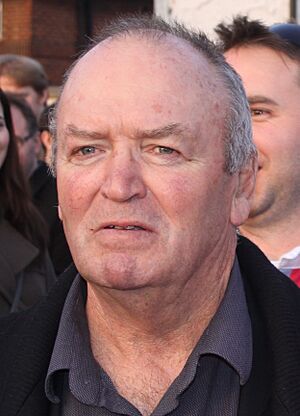
In 1980, Wales lost 23–3 to New Zealand. Wales won two games in the Five Nations in 1980 and 1981. In 1983, they almost lost to Japan, winning 29–24. In 1984, Australia beat Wales 28–9.
Wales won only one game in the 1987 Five Nations before the first Rugby World Cup. Wales beat Ireland and England to reach the semi-finals. They lost to New Zealand but beat Australia to finish third. The next year, Wales won the Triple Crown. However, big losses to New Zealand later that year led to many Welsh players leaving rugby union for rugby league.
Welsh rugby struggled in the 1990s. In 1990, Wales lost all four of their Five Nations matches for the first time. The 1991 World Cup was also disappointing. Wales lost to Samoa and Australia, getting knocked out early.
After winning the Championship in 1994, Wales lost all their games in the 1995 Five Nations Championship. At the 1995 World Cup, Wales lost to New Zealand and Ireland, failing to get past the group stage again. Kevin Bowring became Wales' first full-time coach.
After huge losses to France (51–0) and South Africa (96–13), Graham Henry from New Zealand became coach in 1998. Henry had early success, leading Wales to 10 wins in a row. This included Wales' first win over South Africa, 29–19, at the new Millennium Stadium. Henry was called "the Great Redeemer" by fans. Wales hosted the 1999 World Cup and reached the quarter-finals, but lost to Australia. Henry resigned in 2002 after a lack of success in the Six Nations. His assistant Steve Hansen took over.
During Hansen's time, regional teams were created in Wales in 2003. These teams became the top level of professional rugby in the country. At the 2003 World Cup, Wales lost to New Zealand but scored four tries. They then lost to England in the quarter-finals.
New Beginnings (2004–2007)
Coached by Mike Ruddock, Wales won their first Grand Slam since 1978 in the 2005. A late penalty kick from Gavin Henson helped them beat England in Cardiff for the first time in 12 years. After beating Italy, France, and Scotland, they faced Ireland. Wales won 32–20, giving them their first Championship since 1994. Later that year, they lost 41–3 to New Zealand at home.
Ruddock resigned in 2006. Gareth Jenkins became his replacement. Jenkins led Wales through the 2007 World Cup. They did not get past the group stage after losing 38–34 to Fiji. Jenkins then lost his job, and Warren Gatland from New Zealand became the new coach.
Gatland's Era (2008–2019)
Wales played England at Twickenham for Gatland's first game as coach in the 2008 Six Nations. They had not beaten England there since 1988, but they won 26–19. They won all their games in the Championship, winning another Grand Slam. Later that year, Wales beat Australia 21–18 in Cardiff. However, they then had a six-year losing streak against Australia, New Zealand, and South Africa.
At the 2011 World Cup, Wales reached the semi-finals for the first time since 1987. They lost 9–8 to France after captain Sam Warburton was sent off. The teams met again in March 2012. Wales needed to win to claim their third Six Nations Grand Slam in eight years, which they did with a 16–9 victory. This was followed by eight losses in a row. The losing streak ended during the 2013 Six Nations, where Wales won the Championship again. Wales reached the quarter-finals of the 2015 World Cup by beating England. They then lost 23–19 to South Africa. Wales also won their fourth Grand Slam in 14 years in the 2019 Six Nations.
Wales reached the top spot in the men's World Rugby Rankings in August 2019, holding it for two weeks. They won all their group matches at the 2019 Rugby World Cup for the first time since 1987. They reached the semi-finals but lost to South Africa. Wales then lost to New Zealand in the bronze final, finishing fourth.
Pivac's Time (2019–2022)
Wayne Pivac became Wales coach after the 2019 Rugby World Cup. Pivac's first full international game was a win against Italy in the 2020 Six Nations. However, Wales only won two other games that year. They finished fifth in both the Six Nations and the Autumn Nations Cup. 2021 had ups and downs. Wales won their fourth Six Nations title of the decade. They almost won the Grand Slam but lost to France in their final match. They drew one game and lost one game against Argentina. That autumn, Wales lost to New Zealand and South Africa before beating Fiji and Australia.
Wales finished fifth in the 2022 Six Nations Championship, with their only win at home against Scotland. In the last week of the tournament, Wales lost to Italy 22–21. This was their first home loss to Italy ever.
They then toured South Africa. Wales lost the first game closely, 32–29. The next week, Wales won their first game ever on South African soil, winning 13–12. South Africa won the final game, winning the series 2–1.
Gatland Returns (2022–2025)
On December 5, 2022, Warren Gatland was reappointed as head coach. His contract was until the end of the 2023 Rugby World Cup, with a chance to extend it.
Wales finished fifth in the 2023 Six Nations, only beating Italy. However, they improved at the 2023 Rugby World Cup. They won all their group games and had their biggest ever win over Australia. Argentina knocked them out in the quarter-finals, winning 29–17. Wales then lost all their games in the 2024 Six Nations, including another home loss to Italy.
In November 2024, they lost 24–19 to Fiji. This was their tenth loss in a row, matching a record from 2002 to 2003. It was also their first loss to Fiji at the Millennium Stadium. A week later, they lost 52–20 to Australia, making it 11 losses in a row.
During the 2025 Six Nations, Wales fell to 12th in the world rankings. This was after losing to Italy for the second year in a row and their first loss in Rome since 2007. This was their 14th loss in a row in all games and 8th in a row in Six Nations games. Warren Gatland's departure as head coach was confirmed on February 11, 2025. Matt Sherratt became the interim coach. Wales lost their 15th game in a row to Ireland, 18–27. On March 8, they lost to Scotland 35–29. Wales ended the tournament with a home loss to England, 14–68. This was their heaviest home loss to England ever and their 17th loss in a row. This confirmed a second straight "wooden spoon" (last place) for Wales.
Sherratt stayed on for the Summer tour to Japan. Wales tied the record for most consecutive losses by a top-tier nation (18) with a 24–19 defeat to Japan. The following week, after 644 days without a win, Wales ended their losing streak with a 31–22 victory against Japan.
Tandy Takes Over (2025–Present)
In July 2025, Steve Tandy was appointed as the new permanent head coach. He is the first Welsh-born head coach since Gareth Jenkins in 2007.
Team Kit
Wales plays in red jerseys, white (or sometimes black) shorts, and red socks. For the 2015–16 season, gold was added to the jersey design. The jerseys have the WRU logo, which is based on the Prince of Wales's feathers. The original motto was Ich dien (German for I serve), but now it says WRU.
Wales' alternate kit (change strip) as of 2023 is black with yellow parts. This is inspired by the Flag of Saint David. In the past, Wales has worn black, navy, white, yellow, grey, and green kits. In 2005, Wales wore black jerseys to celebrate the WRU's 125th anniversary.
Over the years, different companies have made Wales' kits and sponsored their shirts. Cotton Traders made the kits from 1992, then Reebok from 1996. The first shirt sponsor was Redstone Telecoms in 2000. Later sponsors included Rockport, Brains Brewery, Admiral, and Isuzu. In 2020, Macron became the kit manufacturer. In 2021, Cazoo became the shirt sponsor, followed by Vodafone in 2023. Go.Compare became the first back-of-shirt sponsor in 2023. Player names returned to the back of the shirts in 2023.
Fan Support
Rugby union and the national team are very important in Welsh culture. Many people say that "rugby is characteristically Welsh." Rugby helped build Wales' modern identity. Welsh fans have a long tradition of singing before and during matches. This comes from the choral tradition in Wales. Popular songs include the hymn Cwm Rhondda, Tom Jones' Delilah, and Max Boyce's Hymns and Arias.
Home Ground
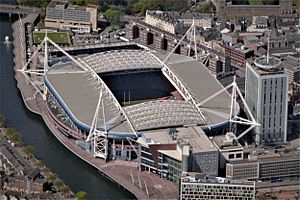
Wales' first home international game was in 1882 at St Helen's Ground in Swansea. In the early years, games were played in Cardiff, Swansea, Newport, and Llanelli. Swansea was used until 1954, when Cardiff Arms Park became the main home. Cardiff Arms Park grew over time, and in 1902, a world record 40,000 fans watched Wales play Scotland.
By 1958, the WRU decided a new national ground was needed because Arms Park often flooded. A new national stadium, known as the National Stadium, officially opened in 1970.
Since 1999, Wales has played all home games at the 74,500-seat Millennium Stadium in Cardiff. This stadium was planned in 1994 to replace the old National Stadium. Construction began in 1997 and finished in 1999, just in time for the Rugby World Cup. It cost £126 million, funded by private money, public funds from the National Lottery, and loans. While the new stadium was being built, Wales used the old Wembley Stadium for home games.
Team Achievements
Six Nations Championship
Wales plays annually in the Six Nations Championship against England, France, Ireland, Italy, and Scotland. It started in 1883 as the Home Nations Championship. Wales first won it in 1893, also winning a Triple Crown. Wales has won the tournament 28 times and shared the win 12 times. Their longest wait between championships was 11 years (1994–2005). Wales won their first Grand Slam in 1908. Their first Six Nations Grand Slam was in 2005. Their most recent Grand Slam was in 2019. Their most recent Triple Crown was in 2021. In 2024, Wales received the "wooden spoon" (finished last) for the first time in 21 years.
Rugby World Cup
Wales has played in every Rugby World Cup since the first one in 1987.
The 1987 tournament was Wales' best. They won all three group games and their quarter-final. They lost to New Zealand in the semi-finals but beat Australia 22–21 to finish third.
In 1991 and 1995, Wales did not get past the group stage, winning only one game in each tournament. They were the first co-host nation not to make it out of the group stage in 1991.
The 1999 and 2003 tournaments were better, with Wales reaching the quarter-finals both times. Wales hosted in 1999 and won their group but lost to Australia in the quarter-finals.
In 2003, they finished second in their group and faced England in the quarter-finals. They lost to England, who went on to win the tournament.
In the 2007 World Cup, Wales again failed to get past the group stage. After losing to Australia and winning against Japan and Canada, they played Fiji for a spot in the quarter-finals. Wales lost 38–34, and Fiji eliminated them.
At the 2011 World Cup, Wales reached the semi-finals for the first time since 1987. They lost 9–8 to France in a game where Wales' captain Sam Warburton was sent off.
At the 2015 World Cup, Wales was in a tough group with Australia, England, Fiji, and Uruguay. They finished second in the group, ahead of hosts England. South Africa then beat Wales in the quarter-finals.
In the 2019 World Cup, Wales won all their group matches. They beat France in the quarter-finals but lost to South Africa in the semi-finals.
In the 2023 World Cup, Wales won all their group matches again. Argentina defeated Wales in the quarter-finals.
Overall Team Stats
When the World Rugby Rankings started in 2003, Wales was ranked 8th. They reached 5th after their Grand Slam win in 2005. A second Grand Slam in 2008 moved them to 6th. They climbed to 4th in 2009 and again after finishing fourth in the 2011 World Cup. Wales has mostly been ranked among the top six teams. They reached 2nd during the 2015 Rugby World Cup. On August 19, 2019, they reached the top spot for the first time after winning 15 of their last 17 games.
Wales has won 407 of their 804 Test matches. Their biggest loss was 96–13 to South Africa in 1998. Their largest win was 98–0 against Japan in 2004. They scored a record 16 tries against Portugal in 1994, also scoring 102 points in that game. Wales' record for most wins in a row is 14. Their record for most losses in a row is 18. During this losing streak, Wales had their second-worst defeat ever, losing 14–68 to England.
Key Players
Current Team Squad
On May 20, interim head coach Matt Sherratt announced a 33-player squad for their 2025 summer tour to Japan.
Caps updated: July 12, 2025 (After Japan v Wales second test)
| Player | Position | Date of birth (age) | Caps | Club/province |
|---|---|---|---|---|
| Liam Belcher | Hooker | 28 April 1996 | 2 | |
| Elliot Dee | Hooker | 7 March 1994 | 56 | |
| Dewi Lake (captain) | Hooker | 16 March 1999 | 22 | |
| Keiron Assiratti | Prop | 30 June 1997 | 15 | |
| Christian Coleman | Prop | 31 August 1998 | 1 | |
| Archie Griffin | Prop | 24 July 2001 | 8 | |
| Garyn Phillips | Prop | 14 May 2001 | 0 | |
| Nicky Smith | Prop | 7 April 1994 | 56 | |
| Gareth Thomas | Prop | 2 August 1993 | 42 | |
| Ben Carter | Lock | 23 January 2001 | 13 | |
| Freddie Thomas | Lock | 9 November 2001 | 4 | |
| Teddy Williams | Lock | 18 October 2000 | 8 | |
| Taulupe Faletau | Back row | 12 November 1990 | 109 | |
| Josh Macleod | Back row | 26 October 1996 | 4 | |
| Alex Mann | Back row | 6 January 2002 | 7 | |
| Taine Plumtree | Back row | 9 March 2000 | 8 | |
| James Ratti | Back row | 14 October 1997 | 3 | |
| Tommy Reffell | Back row | 27 April 1999 | 29 | |
| Aaron Wainwright | Back row | 25 September 1997 | 59 | |
| Kieran Hardy | Scrum-half | 30 November 1995 | 25 | |
| Reuben Morgan-Williams | Scrum-half | 3 February 1998 | 1 | |
| Rhodri Williams | Scrum-half | 5 May 1993 | 10 | |
| Sam Costelow | Fly-half | 10 January 2001 | 19 | |
| Dan Edwards | Fly-half | 7 May 2003 | 3 | |
| Macs Page | Centre | 17 December 2004 | 0 | |
| Joe Roberts | Centre | 10 May 2000 | 6 | |
| Ben Thomas | Centre | 25 November 1998 | 14 | |
| Johnny Williams | Centre | 18 October 1996 | 9 | |
| Josh Adams | Wing | 21 April 1995 | 63 | |
| Keelan Giles | Wing | 29 January 1998 | 1 | |
| Blair Murray | Wing | 9 October 2001 | 10 | |
| Tom Rogers | Wing | 17 December 1998 | 11 | |
| Cameron Winnett | Fullback | 7 January 2003 | 9 |
Famous Players
Eighteen Welsh international players have been added to the World Rugby Hall of Fame. Shane Williams won the World Rugby Player of the Year award in 2008.
Player Records
Neil Jenkins was the first rugby player to score over 1000 Test points. He holds several Welsh records, including most points for Wales (1049) and most points in a single Test match (30). The record for drop-goals is held by Jonathan Davies with 13.
Shane Williams is Wales' top try-scorer with 58 tries. He also holds the record for most tries in Six Nations Championships (22) and Rugby World Cups (10).
Alun Wyn Jones is the most capped player for Wales with 158 games. Eight other players have played 100 or more games. Alun Wyn Jones also holds the record for most matches as captain (52). Gareth Edwards played all 53 of his matches for Wales in a row between 1967 and 1978. He is also Wales' youngest captain at 20 years old.
The youngest player to play for Wales is Tom Prydie. He made his debut in 2010 at age 18 years and 25 days. Prydie is also Wales' youngest try-scorer.
Hall of Fame
The following Welsh players have been inducted into the Welsh Sports Hall of Fame:
- 1990 – Ken Jones
- 1991 – Cliff Jones, Cliff Morgan
- 1992 – Gerald Davies
- 1994 – J. P. R. Williams
- 1997 – Bleddyn Williams
- 1998 – Gareth Edwards, Lewis Jones
- 1999 – Carwyn James, Barry John
- 2000 – David Watkins
- 2001 – Mervyn Davies
- 2002 – Gwyn Nicholls
- 2003 – Jonathan Davies, Willie Davies, John Dawes
- 2005 – John Gwilliam
- 2007 – Arthur Gould, Phil Bennett
- 2008 – Billy Trew
- 2009 – J. J. Williams
- 2012 – Bryn Meredith
- 2013 – Clive Rowlands
- 2015 – Wilf Wooller
- 2017 – Graham Price
- 2019 – Steve Fenwick
- 2022 – Maurice Richards
Coaches and Staff
Coaching History
After a difficult tour to South Africa in 1964, the WRU decided to improve coaching. David Nash became the national team's first coach in 1967. The appointment of coaches helped Wales achieve success in the Five Nations during the 1970s.
Current Coaching Team
Correct as of July 21, 2025
| Position | Name | Nationality |
|---|---|---|
| Head coach | Steve Tandy | |
| Defence coach | Gethin Jones | |
| Forwards coach | Jonathan Humphreys | |
| Skills coach | Neil Jenkins | |
| Scrum consultant | Adam Jones | |
| Skills coach | T. Rhys Thomas | |
| Head of physical performance | Huw Bennett | |
| Head of performance analysis | Rhodri Bown | |
| Team doctor | Geoff Davies | |
| Team manager | Martyn Williams |
See also
 In Spanish: Selección de rugby de Gales para niños
In Spanish: Selección de rugby de Gales para niños
 | Bayard Rustin |
 | Jeannette Carter |
 | Jeremiah A. Brown |


